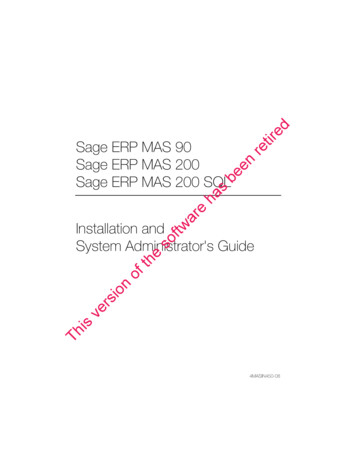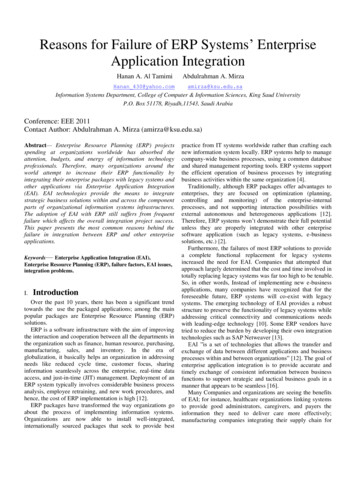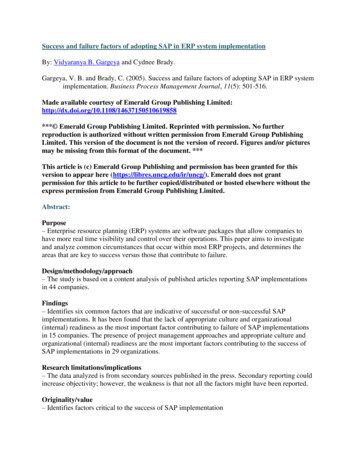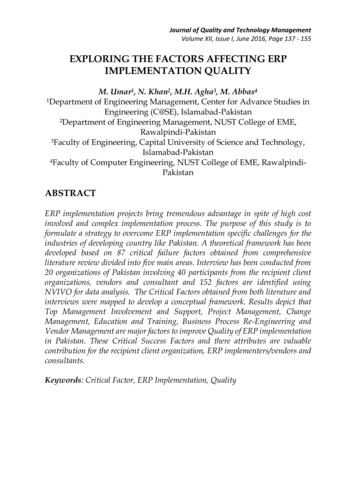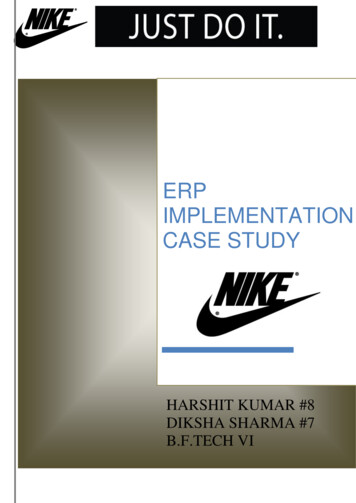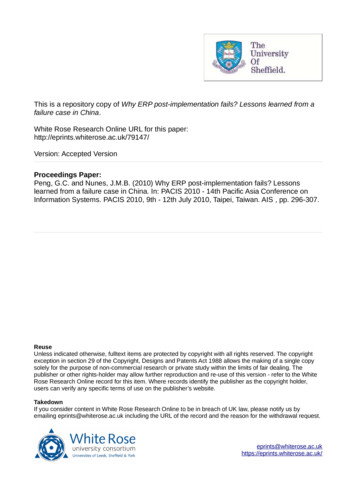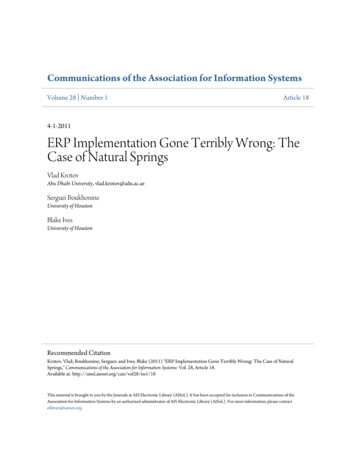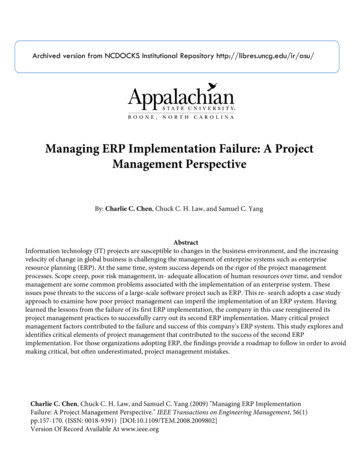
Transcription
Archived version from NCDOCKS Institutional Repository http://libres.uncg.edu/ir/asu/Managing ERP Implementation Failure: A ProjectManagement PerspectiveBy: Charlie C. Chen, Chuck C. H. Law, and Samuel C. YangAbstractInformation technology (IT) projects are susceptible to changes in the business environment, and the increasingvelocity of change in global business is challenging the management of enterprise systems such as enterpriseresource planning (ERP). At the same time, system success depends on the rigor of the project managementprocesses. Scope creep, poor risk management, in- adequate allocation of human resources over time, and vendormanagement are some common problems associated with the implementation of an enterprise system. Theseissues pose threats to the success of a large-scale software project such as ERP. This re- search adopts a case studyapproach to examine how poor project management can imperil the implementation of an ERP system. Havinglearned the lessons from the failure of its first ERP implementation, the company in this case reengineered itsproject management practices to successfully carry out its second ERP implementation. Many critical projectmanagement factors contributed to the failure and success of this company’s ERP system. This study explores andidentifies critical elements of project management that contributed to the success of the second ERPimplementation. For those organizations adopting ERP, the findings provide a roadmap to follow in order to avoidmaking critical, but often underestimated, project management mistakes.Charlie C. Chen, Chuck C. H. Law, and Samuel C. Yang (2009) "Managing ERP ImplementationFailure: A Project Management Perspective." IEEE Transactions on Engineering Management, 56(1)pp.157-170. (ISSN: 0018-9391) [DOI:10.1109/TEM.2008.2009802]Version Of Record Available At www.ieee.org
Index Terms—Enterprise resource planning (ERP) systemdevelopment life cycle (SDLC), information system (IS)management, project management, stage model.I. INTRODUCTIONN ENTERPRISE resource planning (ERP) system is aninformation system (IS) that supports and integrates manyfacets of a business, including planning, manufacturing, sales,and marketing [23]. An enterprise system such as ERP oftenrequires years of implementation and post implementation; itbecomes part of the business and supports its tactical movements and strategic direction. A successfully integrated ERPsystem can enhance operational efficiency by supporting a firm’sbusiness processes as well as create competitive advantages byenabling innovative practices [1]. Indeed, the adoption of ERPsystems has become a global phenomenon. The market for ERPgrew at a rate of 14% in 2004 to become a 23.6 billion marketglobally [48].Despite the popularity of ERP, the failure rate of ERP implementation remains high. According to a survey of 117 organizations conducted by the Conference Board, 40% of ERP projectsAfailed to meet the business case [12]. This result is corroboratedby another study done by information technology (IT)management consultancy Robbins-Gioia LLC, which foundthat 51% of companies across a wide range of industries statedthat their ERP implementations were unsuccessful [50]. Thus,it is critical for executives and managers to fully understand andmanage project management issues so that effectiveapproaches can be devised to address project managementproblems, mitigate interruptions to daily operations, extend thelife of an ERP system, and realize the benefits of enormousinvestments made [41].A business needs to manage its ERP system as anongoing project involving requirements and changemanagement, user support, and maintenance and upgrades. Assuch, managing an ERP project has been described as a“lifelong journey” [2, p. 193]. For several years, a Californiabased multinational company experienced project managementlessons in both failed and successful ERP implementations.These lessons are invaluable to any organization that isplanning to adopt and manage an ERP system. Capturing theprecious experience of this company and sharing it withnewcomers to ERP endeavors could be a significantcontribution to the Management Information Sys- tem (MIS)discipline; such a contribution might include helpingorganizations to avoid mistakes and adopt proper projectmanagement strategies and practices.In order to shed light on project management strategies, challenges, and practices in ERP implementation, this research carries out a case study of a multinational company and approachesthe issue of ERP implementation from a project managementperspective. Accordingly, the study is structured as follows: weprovide a review of the literature on contemporary projectmanagement challenges and best practices in themanagement of large-scale IT and non-IT projects, but withfocus on ERP systems. Nolan’s [42] stage model is used topresent the results of the case study of this company’s ERPimplementation experiences with a particular emphasis onproject management activities. Successful and failed projectlessons are explained within each stage of the stage model,and successful project lessons are further discussed using theIT engagement model. In the context of ERP implementation,these lessons derive important project management themesbased on the process-oriented, project management knowledgeareas. The findings are expected to have theoretical and practicalimplications for academics and practitioners.II. BACKGROUNDA. Contemporary IT Project Management ChallengesThe estimate is that about 74% of IT projects cannot deliver the promised functionality on time and on budget [27].
An ERP implementation is considered a failure if it does notachieve a substantial proportion of its potential organizationalbenefits [13], [61]. This definition is applicable to this studybecause an ERP system is meant to be used throughout an organization. This organizational perspective is also consistentwith the terminal-dependent variable of the “organizational impact” construct in DeLone and McLean [14], who proposed theconstruct since “some I/S researchers, and to a large extent I/Spractitioners, have been concerned with the effect of the information product on organizational performance” [14, p. 62].There are numerous reasons that contribute to an IT projectfailure. Some of them are highly correlated with poor projectmanagement practices. A project life cycle typically comprisesfive process phases: initiation, planning, execution, controlling,and closing. At the initiation and planning phases, IT management may poorly define goals, have an overly simplistic projectplan, use unrealistic deadlines and budgets, and fail to set andmanage expectations on the product (the software being developed) and the project (the development process) to gain supportfrom users, developers, and functional managers [24].During the execution and controlling phases, many projectmanagement issues can surface, such as maintaining clear communication among project participants [35], poor team,management and consultant participation [17], and creepingrequirements due to internal and external environmentalchanges. Poor measurement of project performance is anotherprevalent issue at the controlling stage. Ongoing evaluationof an IT project can be problematic given that different projectparticipants may have different vested interests [49]. Inaddition, organizational diversity [17] and inadequate crossfunctional coordination [28] can further complicate projectexecution and control. The activ- ities during the closing phaseinclude integrating the completed system into daily operations,transferring responsibility to users, releasing resources,rewarding people, and conducting reviews. However, the highturnover rate of skilled professionals and globalization ofthe IT field can further aggravate problems at this stage.B. Literature ReviewWhile the failure rate of ERP projects in particular has beenhigh [12], [50], Robbins-Gioia [50] found that only 56% ofsurvey respondents have a formal program management office (PMO) in place; out of this subset of respondents, only36% reported that their ERP implementation wasunsuccessful. This result underscores the importance of projectmanage- ment in ERP implementation. However, given theimportance of project management in ERP implementation,there is sur- prisingly little research in the literature on projectmanagement as specifically related to ERP. A search ofabstracts of schol- arly articles using the keywords ofproject management and ERP on the following databases,namely: ABI/INFORM, ACM Digital Library, IEEE Explore,Science Direct, and Emerald Fulltext yielded only 22articles. Out of these 22 articles, 14 articles are more closelyrelated to the implementation of ERP systems, while the restmention ERP but are concerned with other software- orbusiness-process-related topics. Out of the14 extracted articles, 9 deals with success factors, models, orbest practices contributing to positive outcomes of ERPimplementations [11], [17], [19], [28], [32], [39], [40], [59],[61] withproject management as one of the factors. There are twoconceptual articles that offer a normative project managementmethod- ology [38] and a project model [31] in ERPimplementations. The remaining three articles all mentionproject management as important in ERP implementations butare mainly concerned with a variety of issues in ERP,including an agent-based approach to ERP deployments [20],technological discourse in organizations while undertaking anERP project [54], and ERP system value as a function of afirm’s strategies and integration mechanisms [57].Project management has been mentioned as one of thecritical factors in ERP implementation [17], [28], [32], [58],[61], and management is encouraged to undertake good projectmanagement practices [38], [40]. However, the extant studies donot shed much light on specific project management processes inthe particular context of ERP. As such, this study seeks toaddress the gap in the literature by obtaining a deeperunderstanding of the practices and problems of ERPimplementation through a detailed case study of amultinational company. In particular, the case study provides anopportunity to observe two sequential ERP projectsimplemented in the same company.III. CONCEPTUAL FOUNDATIONSTo provide a richer understanding of ERP implementation,this study adopts three conceptual models used in the literatureto triangulate on the results obtained from the case company.First, the data collected from the case company are presentedusing a stage model of organizational computing [42]. Second,the widely adopted project management areas of expertise [46]are used to assess the project management practices in both thefirst and second implementations. Finally, the secondimplementation of ERP at the case company is furtherarticulated using the IT engagement model [15], whichexplains the mechanisms contributing to the successful secondimplementation.A. Contemporary Project Management PracticesAll projects, large and small, IT or non-IT, have limits onthree golden constituents: schedule, quality, and budget. Aproject manager constantly makes tradeoff decisions amongthese three constituents. The emphasis of Daniel Goldin, theex-administrator of National Aeronautical and Space Administration (NASA), on “faster-better-cheaper” [43] underscoresthe importance of these constituents. A poor control of any ofthese three constituents poses threats to the success of a project.Although some may argue that longer schedule, more accommodative specification, and larger budget can help meet anychallenge, a 2004 Government Accountability Office report on199 data-mining projects shows that the magnitude of theseconstituents has little to do with the success of a project. Instead, the lack of oversight on any of these constituents is themajor cause of project failures [62].The Project Management Institute systematizes the body
of knowledge of project management into nine areas:scope, management, human resource (HR) management,risk- management,communications-management,procurement management, and integration management inaddition to the three constituents mentioned before [46]. As aproject manager becomes more sophisticated in managingthese areas, the processes used to manage a project becomemore consistent and systematic that can contribute to ahigher rate of project success.The different project management areas have presented difficulties to contemporary management of IT projects. A largescale project managed at different locations, in different timezones, and by different users can create many difficulties. Theseare also applicable to ERP implementations because an ERP system is typically large-scale, cuts across functional boundaries,and often has heterogeneous stakeholders. This is especially soin a multinational company where business units are on different continents. In these situations, decoupling the large-scalesoftware project into flexible and manageable modules can be achallenge, and cross-functional coordination is one of the mostimportant issues in ERP implementations [28], [33]. Excellencein scope, time, cost, risk, and communication management isessential in meeting this challenge.Agile development techniques such as rapid application development can induce higher risks and poorer quality than thetraditional development method. Quality and risk managementof products and processes are crucial to the success of agiledevelopment methods. For ERP implementations in particular,in-house expertise is often lacking, and companies often turnto external consultants in implementing the system [45], butthe outsourcing of jobs does not transfer the ultimatemanagement responsibility for their successful completion.Poor management of outsourcing responsibilities can increaserisks and create integration problems across products andprocesses. The techniques of procurement and integrationmanagement
To provide a richer understanding of ERP implementation, this study adopts three conceptual models used in the literature to triangulate on the results obtained from the case company. First, the data collected from the case company are presented using a stage model of organizational computing [42]. Second, the widely adopted project management areas of expertise [46] are used to assess the .

